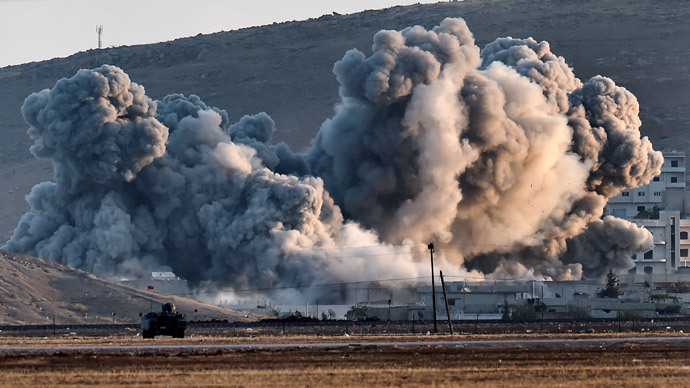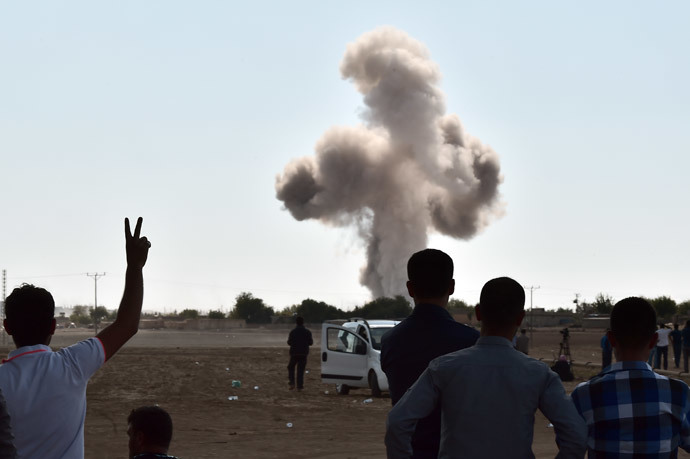‘Islamic State is lesser evil for Turkey than Assad or Kurds’

Turkish President Tayyip Erdogan is more concerned with the Kurdish problem in his own country and changing the Assad regime in Syria than with Islamic State militants, New Delhi based strategic studies professor Brahma Chellaney told RT.
RT:What's it going to take for Ankara to do something to appease the Kurdish protesters, before the riots spin out of control?
Brahma Chellaney: Turkey is facing a bottom challenge largely because of the President Erdogan’s role in the rise of Islamic State. President Erdogan has played a crucial role in the efforts of the US and others to topple President Assad. He was the one who invited the CIA to come and actually train the Syrian rebels. Now he’s facing the blowback, and that blowback is going to be quite severe. In fact it’s going to get Turkey down the same road that Pakistan has traveled. So we are going to see the “Pakistanization” of Turkey in the coming years, and the Kurdish issue is one dimension in the larger picture.
RT:Some pro-Kurdish protesters have resorted to violence. How's this going down with their supporters at home and abroad?
BC: The Kurds have long been repressed in Turkey. They’re not a small minority but a large minority, they dominate southeastern Turkey, the areas bordering with Syria. So they can be a major headache for the Turkish government, especially if the Kurdish insurgency were to revive in Turkey. The Turkish government, I think, handled these protests very prudently. If it tries to use too much force against these Kurdish protesters, the backlash could be quite severe and could trigger a revived Kurdish insurgency.

RT:Would a Turkish ground offensive against Islamic State be able to achieve a quick victory or is Ankara's army more likely to get bogged down?
BC: Let’s be clear on one thing, for President Erdogan, the Islamic State is a lesser evil than President Assad and the Kurds. So he is even not sending his ground forces to battle the Islamic State. After all, his policies have contributed to the rise of Islamic State. He will not put his army against the Islamic State. That is the reason why Turkish tanks are just watching silently as IS terrorists continue to attack this town of Kobani from all sides.
RT:Turkey has reiterated its strong stance against the Syrian government, while Damascus says Ankara is acting as an aggressor. Is regime change in Syria still at the top of the agenda for Turkey?
BC: In fact, President Erdogan is telling Washington that if the US wants the Turkish military to intervene in Syria, it has to be on the specific promise by Washington that regime change in Damascus is part of the larger American game plan. And the Americans at the moment are reluctant to give that promise, and that is the reason why President Erdogan is not pressing his forces into action, even in Kobani, which is the city under siege by the Islamic militants.

RT:Islamic State forces are fighting hard to take Kobani. Why's the city so vital to them?
BC: It’s strategic because it’s located on the access route which connects Turkey right across northern Syria to Iraq, but I think even more than the strategic importance of Kobani, is its symbolic value. This is the only city in northern Syria where some pictures of what is happening are available to the outside world, because it’s located right on the border with Turkey and therefore, international journalists can actually report some action from Turkish territory. But in other places in northern Syria where fighting is still raging, where the Islamic State terrorists are on the attack, we have no international pictures for our audiences. And because Kobani is an ongoing story that the media is covering from Kurdish territory, it has acquired great importance symbolically.
The statements, views and opinions expressed in this column are solely those of the author and do not necessarily represent those of RT.
The statements, views and opinions expressed in this column are solely those of the author and do not necessarily represent those of RT.












